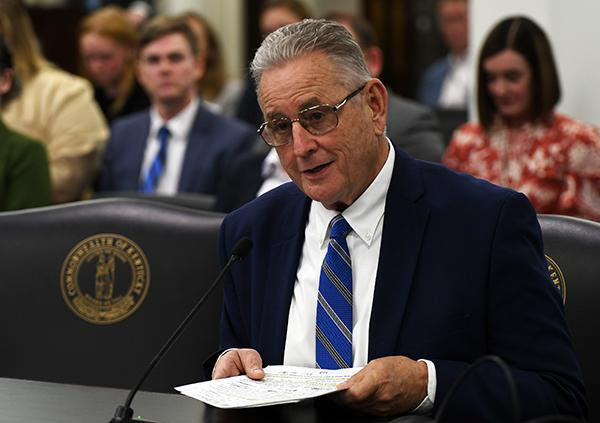GOP lawmaker calls for adding ‘teeth’ to Kentucky’s new curbs on underage vaping

By Sarah Ladd
Kentucky Lantern
A Kentucky Republican will file legislation in 2025 that would license all sellers of vape or tobacco products, giving the Department of Alcoholic Beverage Control enforcement authority over those vendors and empowering its officers to enter the businesses without warrants.
Sen. Jimmy Higdon, R-Lebanon, said state laws limiting the sale of vaping products to buyers 21 or older have “no teeth, no real consequences” for retailers who violate them by selling to underage customers. He presented his legislation idea Tuesday to the Interim Joint Committee on Licensing, Occupations and Administrative Regulations.
His proposal, which is being drafted, would also recommend money from fines go toward programs “to help youth and their peers learn about the dangers of vaping,” he said.
Under the legislation, “regulatory authority would be similar to alcohol regulations,” he explained. “It would give the officers the ability to enter and inspect the premises without a warrant. It will also give them the ability to confiscate evidence of criminal activity.”
Vendors wouldn’t be able to renew their license until they paid any pending fines, and couldn’t re-apply for a new license for a period of two years if their license was revoked.
First-offense fines would be paid by the clerk who sold to a minor, Higdon said, and subsequent fines would be levied on the retailer.
During the 2024 legislative session, lawmakers passed House Bill 11, aimed at curbing underage vaping by limiting sales to “authorized products” or those that have “a safe harbor certification” based on their status with the U.S. Food and Drug Administration. The FDA has authorized 34 tobacco- and menthol-flavored e-cigarette products and devices.
HB 11 was backed by Altria, the country’s largest manufacturer of cigarettes, which also markets FDA-approved vape products. Altria has spent more than $500,000 lobbying the Kentucky legislature since January 2022, according to records filed with the Legislative Ethics Commission.
Abbie Gilbert, a lobbyist with The Denton Group, read a statement from her client, the Vapor Technology Association, which expressed business owners’ concerns with tighter restrictions on their industry.
“House Bill 11 effectively bans flavor vapor products in the commonwealth. To date, the (FDA) has authorized only 34 e-cigarettes, all of which just happened to be owned by the proponents,” she read. “For all other products, manufacturers and retailers would need to prove their products are in safe harbor, and that the FDA commissioner told Congress that does not exist. FDA has not authorized flavored vapor products.”
She asked lawmakers to extend the effective date of the new restrictions until after the U.S. Supreme Court has a chance to rule in a challenge to the FDA’s refusal to authorize flavored vape products, expected later next year.
Kentucky’s new law is set to go into effect Jan. 1. When that happens, Gilbert said, “130 Kentucky small vape businesses will close, eliminating almost 1,000 jobs. Kentucky will lose $63 million in state business and consumption taxes. Further, Kentucky’s economy will suffer the loss of approximately $174 million in economic input.”
Doctor: Nicotine is ‘highly addictive’
Dr. Brit Anderson, a Louisville pediatric emergency medicine physician and vice president and president-elect of the Kentucky Chapter of the American Academy of Pediatrics, testified Tuesday before the committee.
“We know that nicotine is highly addictive, especially for young people, and that many young people who use e-cigarettes go on to smoke traditional cigarettes,” she said. “Nicotine has detrimental effects on a developing brain, including diminished impulse control, learning difficulties, problems with attention — even mood disorders like anxiety and depression.”
Griffin Nemeth, a youth advisory board coordinator for the hashtag movement, #iCANendthetrend at the University of Kentucky, asked lawmakers to do more to protect his peers from the “very pressing” issue of underage vaping.
“We’re asking that legislation be passed to effectively enforce the law against underage sales and to ensure that the effects of industry manipulation of our youth are mitigated,” Nemeth said.
Bullitt Central High School student Philena Ash, also part of #iCANendthetrend, said it’s too easy for her peers to get nicotine.
“In my community, youth can go to any gas station or convenience store and purchase a vape without using their ID,” she said. “Right now, it is too easy for kids to buy these products … being reflected in the number of my peers who are using them.”
Nemeth pushed back on the idea that the proposed changes could hurt businesses.
“I’d like to make a point in saying that this move is not anti-business,” he said. “The only businesses who will be negatively impacted by retail licensure are those acting criminally and selling unauthorized products to underage youth.”